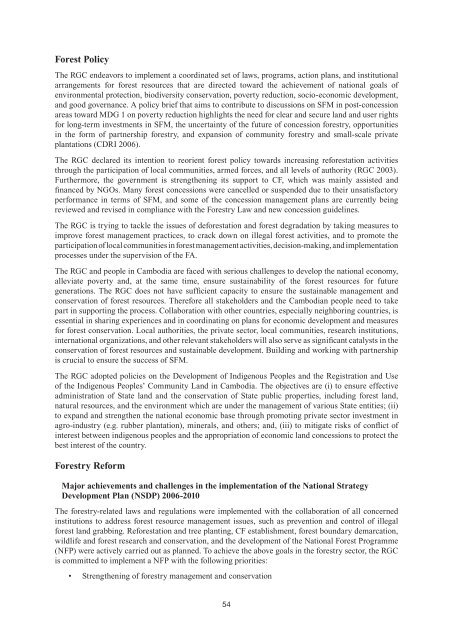Contribution of Forestry to Poverty Alleviation - APFNet
Contribution of Forestry to Poverty Alleviation - APFNet
Contribution of Forestry to Poverty Alleviation - APFNet
You also want an ePaper? Increase the reach of your titles
YUMPU automatically turns print PDFs into web optimized ePapers that Google loves.
Forest Policy<br />
The RGC endeavors <strong>to</strong> implement a coordinated set <strong>of</strong> laws, programs, action plans, and institutional<br />
arrangements for forest resources that are directed <strong>to</strong>ward the achievement <strong>of</strong> national goals <strong>of</strong><br />
environmental protection, biodiversity conservation, poverty reduction, socio-economic development,<br />
and good governance. A policy brief that aims <strong>to</strong> contribute <strong>to</strong> discussions on SFM in post-concession<br />
areas <strong>to</strong>ward MDG 1 on poverty reduction highlights the need for clear and secure land and user rights<br />
for long-term investments in SFM, the uncertainty <strong>of</strong> the future <strong>of</strong> concession forestry, opportunities<br />
in the form <strong>of</strong> partnership forestry, and expansion <strong>of</strong> community forestry and small-scale private<br />
plantations (CDRI 2006).<br />
The RGC declared its intention <strong>to</strong> reorient forest policy <strong>to</strong>wards increasing reforestation activities<br />
through the participation <strong>of</strong> local communities, armed forces, and all levels <strong>of</strong> authority (RGC 2003).<br />
Furthermore, the government is strengthening its support <strong>to</strong> CF, which was mainly assisted and<br />
financed by NGOs. Many forest concessions were cancelled or suspended due <strong>to</strong> their unsatisfac<strong>to</strong>ry<br />
performance in terms <strong>of</strong> SFM, and some <strong>of</strong> the concession management plans are currently being<br />
reviewed and revised in compliance with the <strong>Forestry</strong> Law and new concession guidelines.<br />
The RGC is trying <strong>to</strong> tackle the issues <strong>of</strong> deforestation and forest degradation by taking measures <strong>to</strong><br />
improve forest management practices, <strong>to</strong> crack down on illegal forest activities, and <strong>to</strong> promote the<br />
participation <strong>of</strong> local communities in forest management activities, decision-making, and implementation<br />
processes under the supervision <strong>of</strong> the FA.<br />
The RGC and people in Cambodia are faced with serious challenges <strong>to</strong> develop the national economy,<br />
alleviate poverty and, at the same time, ensure sustainability <strong>of</strong> the forest resources for future<br />
generations. The RGC does not have sufficient capacity <strong>to</strong> ensure the sustainable management and<br />
conservation <strong>of</strong> forest resources. Therefore all stakeholders and the Cambodian people need <strong>to</strong> take<br />
part in supporting the process. Collaboration with other countries, especially neighboring countries, is<br />
essential in sharing experiences and in coordinating on plans for economic development and measures<br />
for forest conservation. Local authorities, the private sec<strong>to</strong>r, local communities, research institutions,<br />
international organizations, and other relevant stakeholders will also serve as significant catalysts in the<br />
conservation <strong>of</strong> forest resources and sustainable development. Building and working with partnership<br />
is crucial <strong>to</strong> ensure the success <strong>of</strong> SFM.<br />
The RGC adopted policies on the Development <strong>of</strong> Indigenous Peoples and the Registration and Use<br />
<strong>of</strong> the Indigenous Peoples’ Community Land in Cambodia. The objectives are (i) <strong>to</strong> ensure effective<br />
administration <strong>of</strong> State land and the conservation <strong>of</strong> State public properties, including forest land,<br />
natural resources, and the environment which are under the management <strong>of</strong> various State entities; (ii)<br />
<strong>to</strong> expand and strengthen the national economic base through promoting private sec<strong>to</strong>r investment in<br />
agro-industry (e.g. rubber plantation), minerals, and others; and, (iii) <strong>to</strong> mitigate risks <strong>of</strong> conflict <strong>of</strong><br />
interest between indigenous peoples and the appropriation <strong>of</strong> economic land concessions <strong>to</strong> protect the<br />
best interest <strong>of</strong> the country.<br />
<strong>Forestry</strong> Reform<br />
Major achievements and challenges in the implementation <strong>of</strong> the National Strategy<br />
Development Plan (NSDP) 2006-2010<br />
The forestry-related laws and regulations were implemented with the collaboration <strong>of</strong> all concerned<br />
institutions <strong>to</strong> address forest resource management issues, such as prevention and control <strong>of</strong> illegal<br />
forest land grabbing. Reforestation and tree planting, CF establishment, forest boundary demarcation,<br />
wildlife and forest research and conservation, and the development <strong>of</strong> the National Forest Programme<br />
(NFP) were actively carried out as planned. To achieve the above goals in the forestry sec<strong>to</strong>r, the RGC<br />
is committed <strong>to</strong> implement a NFP with the following priorities:<br />
• Strengthening <strong>of</strong> forestry management and conservation<br />
54


